The Global Indigenous Online/Virtual Speaker Series: Eli Baxter "Entering the 8th Fire Prophecy"


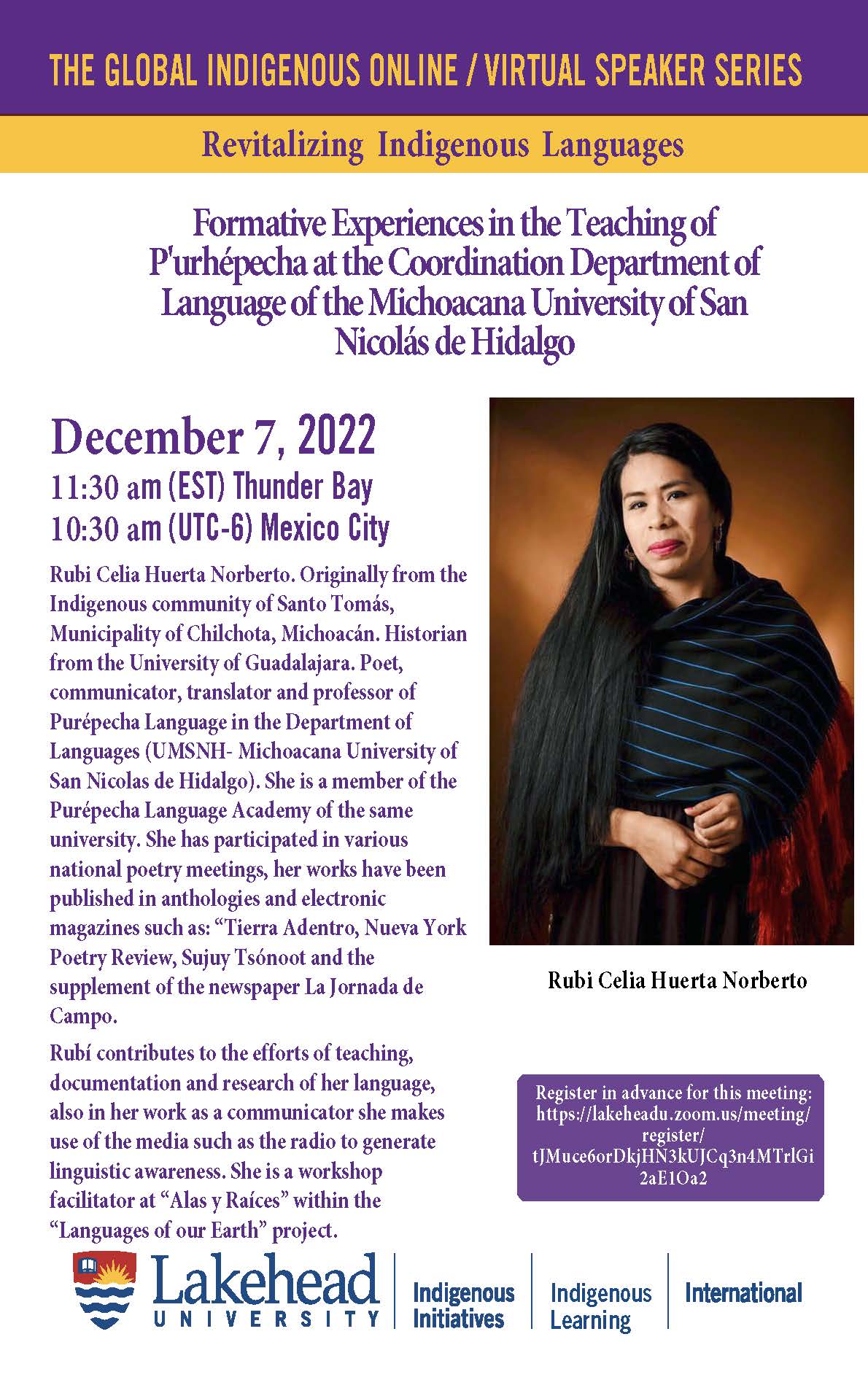
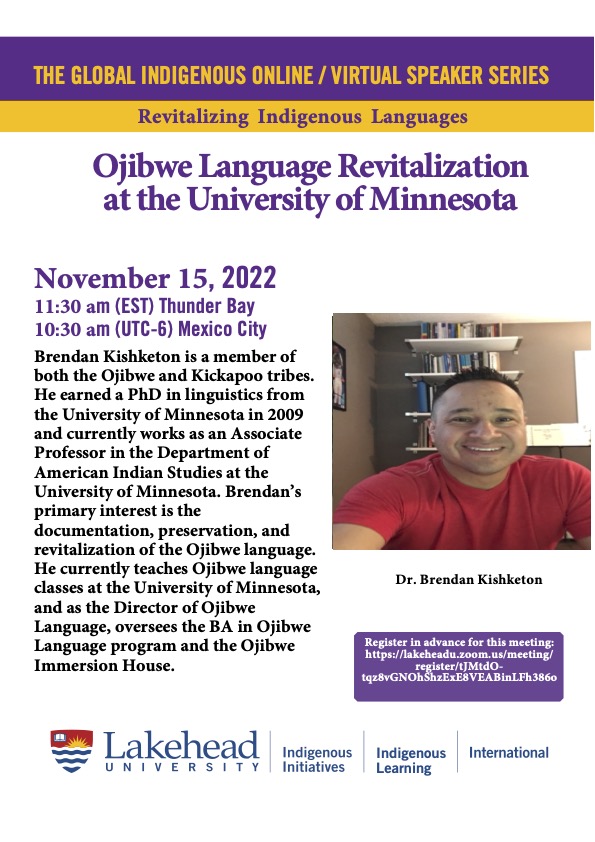
Revitalizing Indigenous Languages
Ojibwe Language Revitalization at the University of Minnesota
Tuesday, November 15, 2022 11:30 am (EST) Thunder Bay
10:30 am (UTC-6) Mexico City
After registering, you will receive a confirmation email.
Brendan Kishketon is a member of both the Ojibwe and Kickapoo tribes. He earned a PhD in linguistics from the University of Minnesota in 2009 and currently works as an Associate Professor in the Department of American Indian Studies at the University of Minnesota. Brendan’s primary interest is the documentation, preservation, and revitalization of the Ojibwe language. He currently teaches Ojibwe language classes at the University of Minnesota, and as the Director of Ojibwe Language, oversees the BA in Ojibwe Language program and the Ojibwe Immersion House.
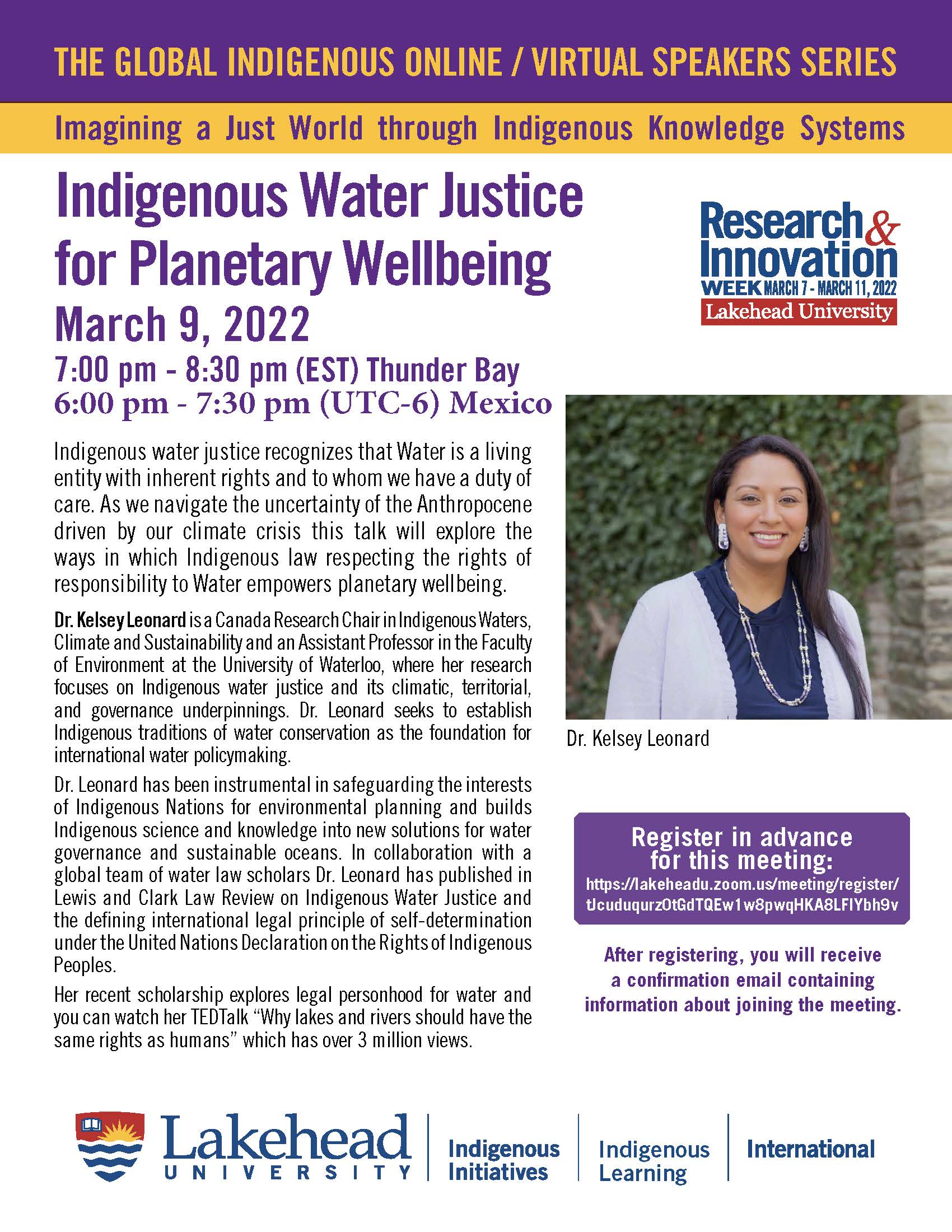
Free Public Event
Bio:
Dr. Kelsey Leonard is a Canada Research Chair in Indigenous Waters, Climate and Sustainability and an Assistant Professor in the Faculty of Environment at the University of Waterloo, where her research focuses on Indigenous water justice and its climatic, territorial, and governance underpinnings. Dr. Leonard seeks to establish Indigenous traditions of water conservation as the foundation for international water policymaking.
Dr. Leonard has been instrumental in safeguarding the interests of Indigenous Nations for environmental planning and builds Indigenous science and knowledge into new solutions for water governance and sustainable oceans. In collaboration with a global team of water law scholars Dr. Leonard has published in Lewis and Clark Law Review on Indigenous Water Justice and the defining international legal principle of self-determination under the United Nations Declaration on the Rights of Indigenous Peoples.
Her recent scholarship explores legal personhood for water and you can watch her TEDTalk “Why lakes and rivers should have the same rights as humans” which has over 3 million views.
Title: Indigenous Water Justice for Planetary Wellbeing
Description: Indigenous water justice recognizes that Water is a living entity with inherent rights and to whom we have a duty of care. As we navigate the uncertainty of the Anthropocene driven by our climate crisis this talk will explore the ways in which Indigenous law respecting the rights of responsibility to Water empowers planetary wellbeing.
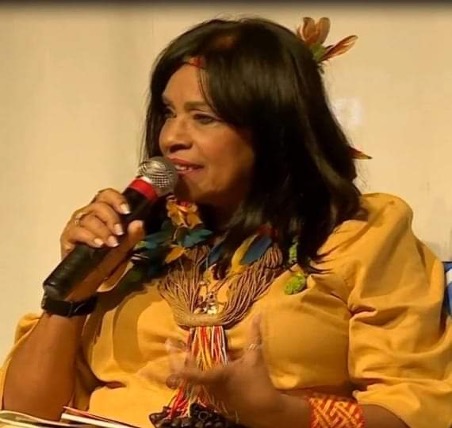
Event Date: December 1, 2021
Event Location: Online
Bio: Dr. Eliane Portiguara
A WRITER THAT TRAVELS THE WORLD
Dr. Eliane Potiguara received the title of "Knight of the Order of Cultural Merit" from the Brazilian government in 2014. She was nominated in 2005 for the International Project "A Thousand Women for the Nobel Peace Prize," she is a writer, poet and teacher. She graduated from the Federal University of Ouro Preto in Portuguese Literature and Education, specializing in Environmental Education. She is from the Potiguara ethnic group, a Brazilian, founder of the 1st organization of Indigenous Women in Brazil: "GRUMIN / Indigenous Women's Education Group (1988)". Eliane is Ambassador for Peace for the Circle of Ambassadors of France and Switzerland. She was part of the workgroup that re-wrote the Universal Declaration of Indigenous Rights at the UN in Geneva. Her flagship book is "HALF FACE, HALF MASK" ("METADE CARA, METADE MÁSCARA")," published by Global Editora, 2004 and in 2019 by GRUMIN EDITIONS. She won a Prize from the England PEN CLUB and the Fund for Free Expression, USA. She has several children's books and writings on thoughts and poetry in national and international anthologies. To access her books and life history, visit the author's official website:
www.elianepotiguara.org.br
E-mail: elianepotiguara@uol.org.br/elianepotiguara@gmail.com
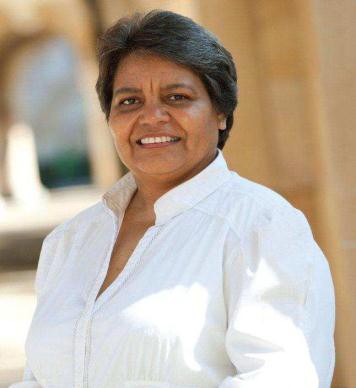
Bio
Dr. Linda Payi Ford is a Traditional Owner Rak Mak Mak Marranunggu woman from Kurrindju. Ford’s country is Kurrindju in the Finniss River and Reynold River regions southwest of Darwin in the Northern Territory, Australia. Associate Professor Ford is a Principal Research Fellow in the Northern Institute in the College of Indigenous Futures, Arts and Society located in Darwin, Northern Territory, Australia. She applies her Mirrwana and Wurrkama (2005) methodology to her Indigenous research practice and theory across multiple disciplinary fields. Ford balances her academic research career, teaching and learning in higher education, family and caring for country and culture.
Title
Mirrwana & Wurrkama Theory: an Indigenist Research Methodology
Abstract
Mirrwana and Wurrkama Theory: an Indigenist Research Methodology describes my life’s work in social science, humanities, and the educational discipline field. I have practiced in community service, research, teaching and learning. This seminar will highlight key areas that include Australian Aboriginal engagement, Indigenist research background, an Aboriginal methodology, Mirrwana and Wurrkama theory. In 2001 – 2003, the research question was how to embed Indigenous knowledge into Higher Education core curriculum, Bachelor of Primary Education (Pre-service Teacher Education) course in the Faculty of Science, Information, Technology & Education, Charles Darwin University. It was achieved.
My post-doctoral Indigenist research spans across multiple discipline fields over two decades. The Indigenist research and knowledge framework and guidelines assists practitioners to understand how Indigenist researcher’s connectedness operates on country. Collaborative partnerships are the keys for Aboriginal engagement. The Aboriginal community know how to interpret climate change events, and its impact on the Australian environment. Post-COVID and bushfires have impacted the Australian environment, psyche, and worldviews. The views have been disrupted. What is the new norm? Indigenist research and knowledge are influencing paradigm shifts as the Australian public are seeking more information. This has allowed an authoritative space to include a new Indigenist research narrative in government and non-government policies.
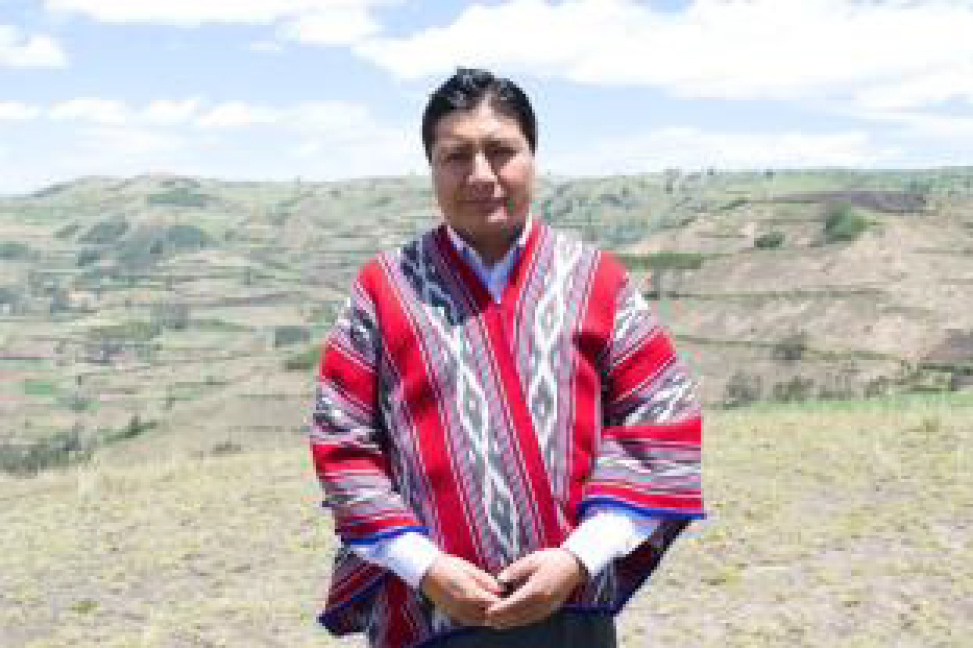
TITLE: Movimientos Indígenas, Educación intercultural y la pandemia: Chimborazo-Ecuador
Indigenous Movements, Intercultural Education and the Pandemic: Chimborazo-Ecuador
BIOGRAPHY:
Juan Illicachi Guzñay (Kichwa) is a Professor at National University of Chimborazo (UNACH) and has a PhD in Anthropology from the Center for Higher Studies in Social Anthropology and Master’s degrees in Ethnic Studies, and Interculturality and Higher Education. Dr. Illicachi Guzñay was the former rector of the Intercultural Bilingual University of Nationalities and Peoples Indigenous "Amawtay Wasi" and has held professorships at Technical University of Ambato and Salesian Polytechnic University. Dr. Illicachi Guzñay was also a teacher in Intercultural Bilingual Education from 1997 to 2014 and currently is a catechist of the progressive Church, leader of the Indigenous movement of Chimborazo. He has led a number of research projects and has published several books and scientific articles. His areas of expertise include power, religion, interculturality, education and gender.
BIOGRAPHY (Spanish):
Juan Illicachi Guzñay (Kichwa) es Catedrático de la Universidad Nacional del Chimborazo (UNACH) y Doctor en Antropología por el Centro de Estudios Superiores en Antropología Social y Maestría en Estudios Étnicos e Interculturalidad y Educación Superior. El Dr. Illicachi Guzñay fue el ex rector de la Universidad Intercultural Bilingüe de Nacionalidades y Pueblos Indígenas "Amawtay Wasi" y ha sido profesor en la Universidad Técnica de Ambato y en la Universidad Politécnica Salesiana. El Dr. Illicachi Guzñay también fue docente en Educación Intercultural Bilingüe de 1997 a 2014 y actualmente es catequista de la Iglesia progresista, líder del movimiento Indígena del Chimborazo. Ha dirigido varios proyectos de investigación y ha publicado varios libros y artículos científicos. Sus áreas de especialización incluyen poder, religión, interculturalidad, educación y género.
TITLE: Movimientos Indígenas, Educación intercultural y la pandemia: Chimborazo-Ecuador
Indigenous Movements, Intercultural Education and the Pandemic: Chimborazo-Ecuador
ABSTRACT
In this lecture, Dr. Illicachi Guzñay discusses how interculturality and education have become a field of struggle against the hegemonic epistemic project. Specifically, he considers the relationship between Indigenous organizations and the intercultural education system in Ecuador and how this interface is a space for disputing, negotiating and accommodating power structures. Special consideration is given to how the Covid-19 pandemic has contributed to the continuity as well as the rupture of Indigenous led political and epistemic action within this context.
ABSTRACT (Spanish)
El texto analiza, a partir de la etnografía y una bibliografía especializada, la manera cómo la interculturalidad y la educación se ha constituido en un campo de lucha frente al proyecto epistémico hegemónico y cómo la pandemia, denominado Covid 19, ha contribuido en la continuidad, por un lado y por otro lado, en la ruptura de la acción política y epistémica de la nacionalidades y pueblos indígenas de Ecuador. Como sustento de esta presentación y para un lector no familiarizado se confecciona una genealogía y estructura organizativa de los movimientos indígenas del país, considerando que la educación intercultural y las organizaciones indígenas se constituyen mutuamente y cómo estos campos subalternos luchan, negocian o acomodan en la estructura del poder.
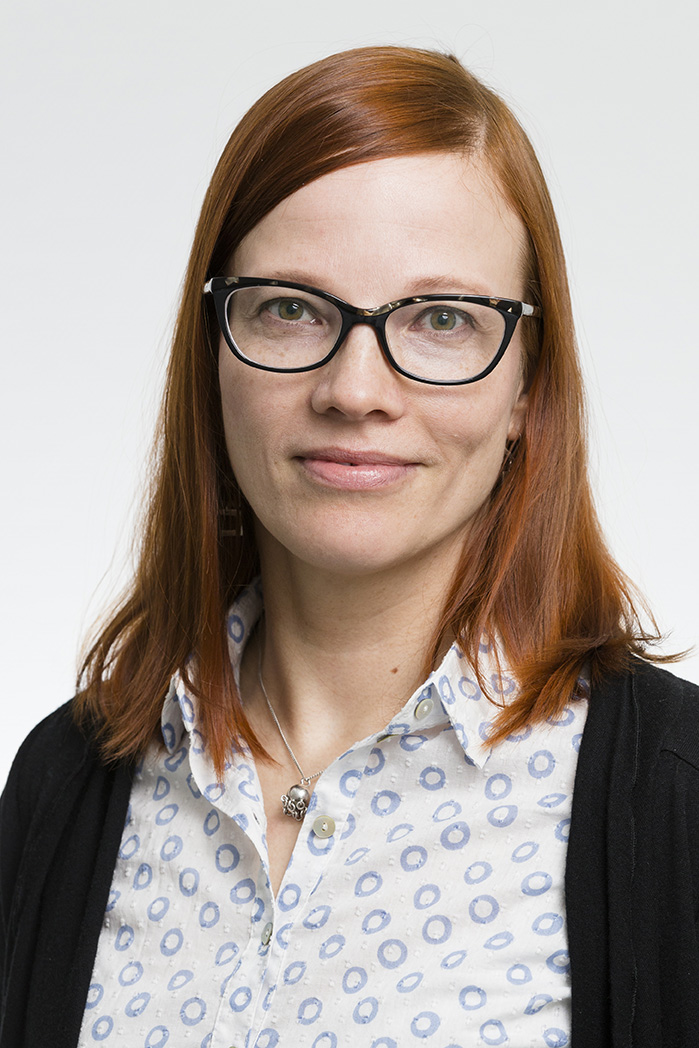
Bio
Dr. Rauna Kuokkanen (Sámi) is research professor of Arctic Indigenous Studies at the University of Lapland (Finland) and adjunct professor at the University of Toronto. Prior to her current position, she was a professor of political science and Indigenous Studies at the University of Toronto. She is the author of three books, Reshaping the University: Responsibility, Indigenous Epistemes and the Logic of the Gift (2007), Boaris dego eana: Eamiálbmogiid diehtu, filosofiijat ja dutkan (in Sámi, translated title: As Old as the Earth. Indigenous Knowledge, Philosophies and Research, 2009), and award-winning Restructuring Relations: Indigenous Self-Determination, Governance and Gender (Oxford University Press, 2019). Her research focuses on comparative Indigenous politics, Indigenous feminist theory, governance, law and Nordic settler colonialism and has most recently published in Human Rights Review, Settler Colonial Studies and International Journal of Heritage Studies. Currently she leads the Siida School project, a community driven, collaborative project by Sámi scholars, artists and activists seeking to reclaim and reconstruct Siida practices that could operate as part of Sámi governance structures today.
Indigenous Self-Determination and Gender Justice
Abstract
Indigenous self-determination is about restructuring relations of domination. Frequently framed as a quest and vision for justice and freedom, Indigenous self-determination typically has focused on gaining equal standing with other peoples. My research has demonstrated that the quest of Indigenous self-determination for justice and freedom must include gender justice. The imposition of colonial structures, including those of governance, have not only transformed gender relations in Indigenous communities but also instituted gender regimes in contemporary Indigenous political organizations comparable to those found in Western political structures. In my talk, I draw on my new book, Restructuring Relations: Indigenous Self-Determination, Governance and Gender to discuss the ways in which Indigenous women in Canada, Greenland and Scandinavia envision gender justice in their communities. These practices include protecting and upholding children, eliminating gender violence and rematriating Indigenous governance.
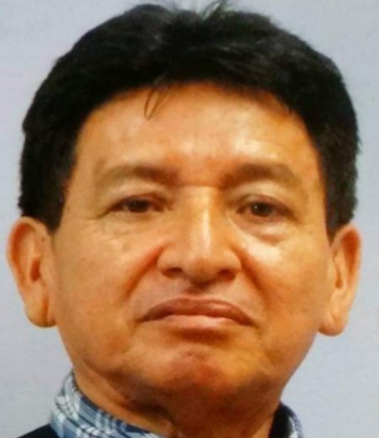
BIOGRAPHY:
Jorge Miguel Cocom Pech, is a native speaker of the Mayan peninsular language. He was born in Calkiní, Campeche, Mexico, in 1952. He now lives in Mexico City and writes narrative, poetry and essays. He has published the following books: Muk'ult'an in nool, (Secrets of grandfather) UNAM (2001, 2006); Secrets of a Mayan Grandfather, Editorial Magisterio, Colombia, (2009); The Nine Questions, Edebe (2012); J-nool Gregorioe 'juntúul maits'il maya, (Grandfather Gregorio, a Mayan Sage), Conaculta, (2012); K'aankan ya'il íicho'ob: waye ', ma' a t'aan ich maya, Golden Tears: Here, Do Not speak Mayan! Trillas-Conaculta, (2013); Nichjkó'il peek ', (The Ethics of the Dog), Secretariat of Culture of the Government of Campeche 2017. He has been a member of Mexico’s National System of Art Creators (2009) and (2014); and he has received the following awards: The Grand International Poetry Prize 2005, awarded by the East-West Academy of Romania; The Indigenous Literatures Award of America 2016 at the prestigious Guadalajara Book Fair, and he was granted the Poet of the Year Award 2016, by The Américas Poetry Festival of New York. His lyrical work has been published in anthologies in Mexico and the world.
Jorge Miguel Cocom Pech, hablante de la lengua maya peninsular, nació en Calkiní, Campeche en 1952. Vive en la Ciudad de México. Escribe narrativa, poesía y ensayo. Ha publicado los libros Muk'ult'an in nool, Secretos del abuelo Unam (2001, 2006); Secretos de un abuelo maya, Editorial Magisterio, Colombia, (2009); Las nueve) preguntas, Edebe (2012 ); J-nool Gregorioe' juntúul maits'il maya, El abuelo Gregorio, un sabio maya, Conaculta, (2012); K'aankan ya'il
íicho'ob: waye', ¡ma' a t'aan ich maya, Lágrimas de oro: aquí, ¡no hables maya! Trillas-Conaculta, (2013); Nichjkó'il peek', La ética del perro, Secretaría de Cultura del Gobierno de Campeche 2017.
Ha sido miembro del Sistema Nacional de Creadores de Arte (2009) y (2014); y recibido los siguientes galardones: El Gran Premio Internacional de Poesía 2005, otorgado por la Academia Oriente-Occidente de Rumanía; El Premio de Literaturas Indígenas de América 2016, FIL de Guadalajara, México; y Grants the Poet of de Year Award 2016, otorgado por The Américas Poetry Festival of New York . Su obra lírica ha sido publicada en antologías de México y en el
extranjero.
TITLE: Literaturas indígenas en México. (Un breve esbozo)- Indigenous Literatures in Mexico. (A brief outline)
ABSTRACT
Through a selected reading of his works, Mr. Jorge Cocom Pech will exchange ideas on the importance of reverting to ancestral knowledge and customs to face the critical issues of our time. In particular, Mr. Cocom Pech will discuss how non-symbolic rituals and myths, lost now in urbanization, are essential to existentialism. Benefiting from strong family ties including with his Grandfather Gregorio, Jorge was able to experience important ceremonial rituals which allow him to challenge rationality with existence and colonialism.
A través de una lectura seleccionada de sus obras, el Sr. Jorge Cocom Pech intercambiará ideas sobre la importancia de volver a los saberes y costumbres ancestrales para enfrentar los temas críticos de nuestro tiempo. En particular, Jorge Cocom Pech discutirá cómo los rituales y mitos no simbólicos, perdidos ahora en la urbanización, son esenciales para el existencialismo. Beneficiándose de fuertes lazos familiares, incluso con su abuelo Gregorio, Jorge pudo experimentar importantes rituales ceremoniales que le permiten desafiar la racionalidad con la existencia y el colonialismo.
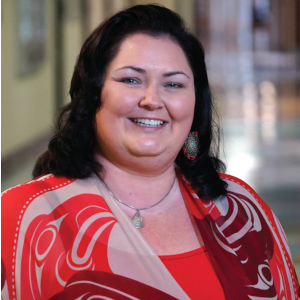
Professional title
Assistant Professor
Bio
Wendy F. Smythe, PhD. is Alaska Native Haida from Hydaburg, Alaska. Her Haida name is K’ah Skaahluwaa, from the Xáadas (Haida) clan of Sdast’ aas (Fish egg house).
Dr. Smythe is an Assistant Professor at the University of Minnesota Duluth (UMD), she holds a joint appointment between the Departments of American Indian Studies and Earth & Environmental Sciences. She was named the 2019 Professional of the Year by the American Indian Science and Engineering Society (AISES) for her interdisciplinary research in geoscience, Native Education, and policy. In 2020 Dr. Smythe was elected to the AISES Board of Directors.
Prior to joining UMD in August 2019 she served as an Executive Branch AAAS Science & Technology Policy Fellow hosted by the National Science Foundation in the Directorates for Education & Human Resources and in the Directorate of Geoscience in the Division of Earth Science Systems for two years.
She is a geoscientist and oceanographer whose research focuses on examining microbial ecology and molecular diversity, biogeochemistry, and biomineralization in metalliferous, iron and manganese rich groundwater and marine ecosystems from deep-sea hydrothermal volcanoes to hydrothermal springs in Southeast Alaska and Yellowstone National Park. In addition, Dr. Smythe conducts research and training for geoscience faculty, researchers and federal agencies to gain a better understanding, appreciation and respect for diverse students, faculty, and communities, and is a signatory for the “Call to Action for an Anti-Racist Science Community from Geoscientists of Color (https://notimeforsilence.org).
Over the last 13 years Dr. Smythe has had the honor of partnering with her tribal community after founding The Haida Geoscience Education Program working to couple STEM disciplines with Traditional Knowledge in K-12 education by incorporating language and cultural values. She serves on the board of directors for the Xáadas Kil Kuyaas Foundation a 501 (C) 3 whose mission is to promote, preserve, and perpetuate the highly endangered Northern Haida language. Through her work, she seeks to increase the number of Native American- - Alaska Native students represented in STEM disciplines thereby increasing diversity and innovation, and to teach the next generation of Native leaders to embrace their Native identity.